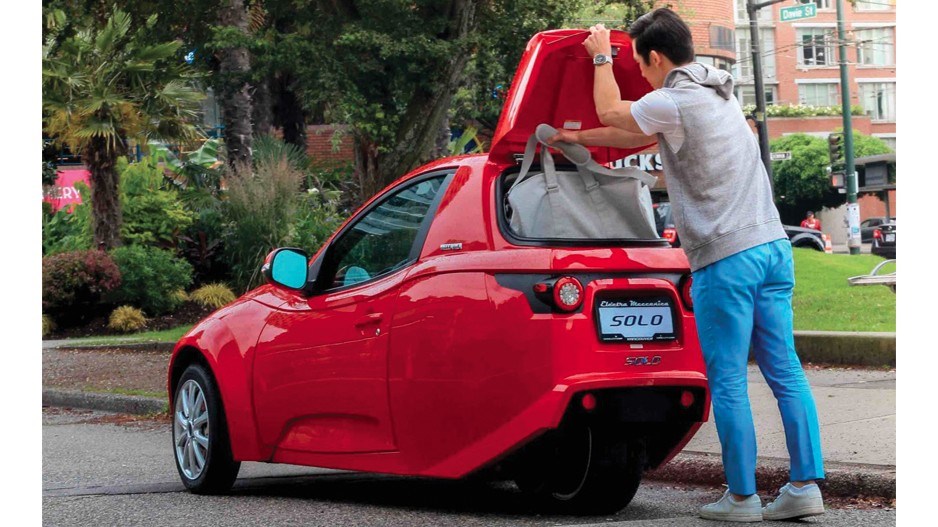With US$30 million in fresh investor capital locked in this month, Jay Giraud is ready for his electric vehicle (EV) startup to graduate from one-man band to full-symphony status.
“You’re trying to create a song and then as you turn a corner, you put down all the instruments one at a time until you’re no longer playing,” said the co-founder and CEO of Damon Motors Inc. “You’re just conducting the orchestra.”
The Vancouver company specializing in electric motorcycles has grown from a team of 13 to a team of 50 over the past eight months. With 1,000 pre-orders for its electric motorcycles, Damon is readying a manufacturing facility in Surrey that could produce up to 50,000 vehicles annually.
Vancouver is no Detroit or southern Ontario, but Giraud said it’s imperative that manufacturing of Damon EVs starts close to its 12,000-square-foot home base on Powell Street.
“No. 1 is proximity to R&D,” he said, referring to the Vancouver head office featuring design studios, 3D printers and machines that test the power train.
Global sales of EVs have been accelerating in recent years, putting the pressure on EV startups to keep up with demand.
A July 2020 Deloitte Inc. report forecasts sales of electric vehicles will reach 25.3 million by 2030, while plug-in hybrid vehicle sales will reach 5.8 million units.
That combined 31.1 million units far exceeds the 2.5 million sold in 2020, and other Vancouver EV companies are firming up their designs on production.
ElectraMeccanica Vehicles Corp. (Nasdaq:SOLO) revealed earlier this month it’s selected Mesa, Arizona, as its home base for manufacturing in North America following a 14-month search.
The EV maker, best known for its distinctive three-wheeled, single-passenger flagship Solo vehicle, already has one manufacturing facility in China.
About 200 workers will initially carry out light assembly when the 235,000-square-foot facility opens next year.
“We wanted to build an assembly facility for the U.S. so that we can have a made-in-U.S.A. product,” CEO Paul Rivera said, adding that he needed to mitigate against the potential for tariffs to be slapped on Solo vehicles entering the U.S. from China.
“But the other part is that we are really looking to build out an engineering technical centre.”
He also cited Arizona’s efforts to draw in other EV companies – Lucid Motors Inc. recently completed the first phase of its manufacturing plant, and Nikola Motor Co. is headquartered in Phoenix – as one of the considerations in setting up south of the border.
“And then we start to look at that along with the logistics to our target market,” Rivera said. “Right down the corridor is southern California, which is just a huge, huge target market for us.”
Meanwhile, California has been the home for the final assembly of electric buses from fellow Vancouver EV company GreenPower Motor Co. Inc. (Nasdaq:GP).
CEO and chairman Fraser Atkinson said that while some contract manufacturers assist with aspects of the build, final assembly must be completed in the U.S. for his Canadian company to comply with Buy American clauses for buses sold to transit authorities tapping federal funding.
And while the potential for the Joe Biden administration to impose tariffs on China-built Solo vehicles remained a sticking point for ElectraMeccanica, Atkinson said his company is benefiting from new U.S. President Biden’s policies.
On the campaign trail last year, Biden pledged to convert all 500,000 school buses on American roads into zero-emissions vehicles by 2030.
Now that Biden is president, Atkinson said the pledge has “created literally a gold rush within the electric school bus space. It was fortunate that this didn’t occur two years ago because … it allowed us to fine tune our product.”
As of January, GreenPower is producing 10 of its 12-metre BEAST (Battery Electric Automotive School Transportation) models per month.
It’s also producing 20 of its signature EV Star models each month, but Atkinson said a deal with motorhome manufacturer Forest River Inc. holds the potential for his company to ramp up production further. The Forest River partnership calls for 150 vehicles over three years.
Funding the growth plans required GreenPower to complete a Nasdaq listing last year that raised US$37 million.
Giraud said his company is well paced to meet its shipping targets of early to mid-2022, but he acknowledged his goal was to have the electric motorcycles out to customers this year had the pandemic not thrown sand into the gears of those plans.
“It was very exciting to finally close the financing round,” he said. “Frankly speaking, that financing should have happened exactly a year ago.” •




